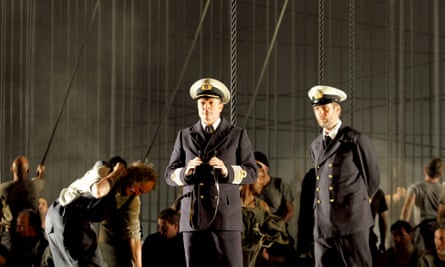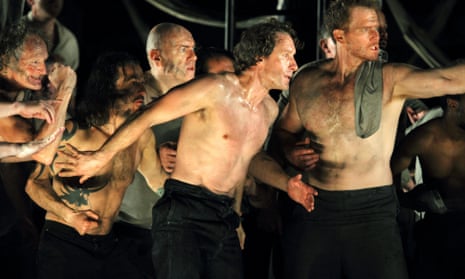Billy Budd is one of Benjamin Britten’s greatest achievements, yet it’s almost 20 years since it was last seen on the stage on which it received its world premiere in 1951. Deborah Warner’s production comes to Covent Garden, London, from the Teatro Reale in Madrid, where it was premiered in 2016. The conductor, Ivor Bolton, as well as most of the all-male cast, have travelled with the production, too.
It’s a spare, rather plain staging, and immaculately presented within its parameters. Those parameters, though, sometimes seem unnecessarily narrow. Michael Levine’s set designs and Chloé Obolensky’s costumes shuttle between historical periods: a profusion of ropes, ladders and swathes of canvas on stage does indeed suggest that the action is taking place on a naval frigate during the French wars at the end of the 18th century, as the libretto specifies, while the uniforms of the officers – part Ruritanian navy, part bellboys from some swanky international hotel – and assorted passing anachronisms signal otherwise. But there’s little tang of the sea, despite a channel of water invisible from the stalls, stretching across the stage, through which characters occasionally and rather randomly splash.

The characters of the protagonists also take a while to tease out. Jacques Imbrailo’s Billy and Brindley Sherratt’s Claggart are standard enough portrayals of the extremes of good and evil – the former an irrepressible live wire, the latter bespectacled and too obviously sociopathic – but Toby Spence’s Captain Vere is an unconvincing enigma. His appearance in the prologue and epilogue hardly suggests the “old man” Vere himself describes, more someone recently retired from the service (a retirement perhaps hastened by the still-raw events on HMS Indomitable). While in command on the ship he cuts a remote, curiously static figure, neither the man of action likely to inspire the love of his crew or one to confide in his officers, even though he feels able to receive two of them in his cabin wearing a bathrobe and slippers.

Vere stirs into life only when Claggart makes his accusations against Billy, and it’s only then too that the production acquires a dramatic focus; even the muster scene at the beginning of the second act had seemed inert, never conveying the idea of a ship preparing for battle, though the singing of the chorus there and elsewhere is stirringly superb. Warner does add a few directorial glosses along the way, the most telling, perhaps, the clear disgust of the three officers at the court martial (David Soar’s Flint, Thomas Oliemans’s Redburn and Peter Kellner’s Ratcliffe) at Vere’s inability to intervene on Billy’s behalf when the death sentence is passed, though there’s little that sheds new light on one of Britten’s most conflicted operas.
There is some magnificent singing – the implacable blackness of Claggart’s credo as Sherratt delivers it, Imbrailo’s beautifully modulated delivery of Billy’s final monologue in the darbies – and some crisply focused portrayals of the smaller roles, especially from Duncan Rock as Donald and Clive Bayley as Dansker. Bolton’s conducting has its moments too, but can never really compensate for the dramatic intensity and sense of involvement that the production is so slow to generate.
In rep at Royal Opera House, London, until 10 May. Box office: 020-7304 4000.

Comments (…)
Sign in or create your Guardian account to join the discussion